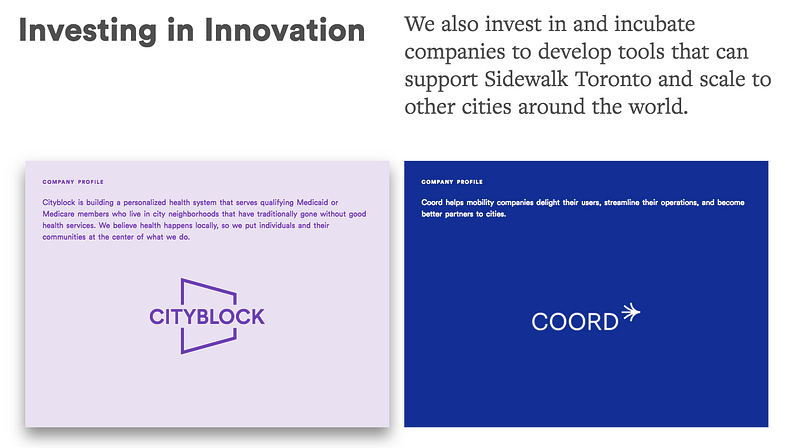From Medium, March 28:
Debrief on Sidewalk Toronto Public Meeting #1— Evasive on Data Products, No Answer on Data Residency
Last week, Sidewalk Toronto held its first public meeting — you can watch a portion of it here. Affordability, sustainability, and income inequality were trotted out again as three headliner issues. These are major issues for government and residents. Treating them as marketing fodder remains uncomfortable to sit through. Through repetition, it may begin to seem normal to talk about how land development and a global product road map can address these major issues. It’s not.Business Model — MurkyWhen asked about its business model, and the products and services that Sidewalk Labs expects to create in Toronto, Rit Aggarwala, Head of Urban Systems at Sidewalk Labs, answered that “it’s a little unclear, there’s a bunch of options that could present themselves.” Real estate, infrastructure, and data products made the list, with a comment that data products may represent only a small part of the plan. No data products were named. But are there Sidewalk Labs data products in development? Sure there are. Here are five. The first three are true products, the last two are ‘labs’, but they’ve got names and a focus.Coord “enables software applications to connect with transport options like ride-hail, bike-share, and car-share.”Cityblock “is your personalized health system.”Intersection “enriches people’s everyday journeys by delivering connectivity, information, and content that elevate the urban experience.”Sense “is exploring digital tools that use real-time data to improve the safety and management of intersections, parks, and other open spaces.”Model Lab “explores tools that help communities build consensus on affordability, sustainability, and transportation needs.”Concrete examples to talk about. Why not answer this question directly? If these are the “pilots” that keep being referenced in relation to this project it was the right time to introduce them, and begin to talk about data in context. What data do/will these products use? How will it be collected? Who will own it? Also, on a communications front, there was an update to the commercialization of data language — gone was the “we won’t use data for commercial purposes” language, newly introduced was “Not using or selling personal information for advertising purposes.”

Source: https://www.sidewalklabs.com/

Source: https://www.sidewalklabs.com/
HT: the writer's twitter feed.Data Residency— UnclearRelated to discussions of data, a low of the night played out when a participant asked where the data collected from this project would be stored. The direct answer everyone was expecting was Canada. Sidewalk Labs did not answer the question definitively. “We are here in Canada, and the information and data that is going to be collected, we respect it from the beginning — we’re going to engage the data governance group on it.” Then security was raised. It was a perfect moment to commit to keeping the data in Canada. But no....MUCH MORE